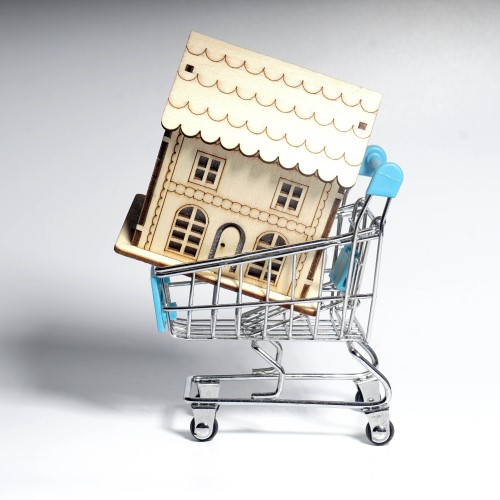How much deposit do I need to buy a house?
You should aim to put down at least 5% of the purchase price of your property as a mortgage deposit. For a £200,000 home, this would be £10,000.
But if you put down a bigger deposit, you'll be able to get better mortgage rates.
Find out more about how mortgage deposits work and how to buy your first home sooner below.
What is a mortgage deposit?
A deposit is the money you put towards buying a property that comes from your own pocket, rather than the money that comes from a mortgage. It tends to be measured as a percentage of what the property costs.
For example, if you’re hoping to buy a property that costs £150,000 and you have £15,000 saved up that you can put towards it, you would be putting down a 10% deposit. You’d need to borrow £135,000 from a mortgage lender.
Usually, the higher the percentage that you buy yourself, the better your mortgage rates, meaning it will cost you less to pay your mortgage each month.
Mortgage lenders like you to put some of your own money towards buying a house. That’s because it gives you a good reason to look after the property and to keep paying the monthly mortgage repayments – if you don’t, you could lose your own money.
Some providers are starting to offer "100% mortgages" or "No-deposit mortgages". These are available usually only to first-time buyers who have been renting (and paying their rent on time) for at least a year. They usually have higher interest rates than mortgages where you have paid a deposit but they can be a good option for some.
How much is a mortgage deposit?
In the UK, you will usually need to pay at least 5% of the cost of the property yourself as a deposit. But this depends on the mortgage lender and your own situation, for example first-time buyers are more likely to be approved for mortgages with low deposits and you might be able to apply for a 100% mortgage, although there are drawbacks to no-deposit mortgages.
Some mortgage lenders will ask for a bigger deposit than this and a general rule-of-thumb is to save a deposit that is 20% of the price of the property you want to buy.
So, in our £150,000 house example above, a 20% deposit would be £30,000. If you’re a first-time buyer, you might find that there are mortgages you can take out that ask for a lower deposit – a 5% deposit would be £7,500.
The exact amount depends on how much the property costs. You could opt for a property that costs less so that your deposit makes up a higher percentage of the total cost.
What are the costs of buying a house?
While your mortgage deposit is likely to be the biggest thing you need to save up for, there are a few other things you'll need to pay for.
How much might a first-time buyer need to save?
The table below is to help you work out how much you'll need to save if you're a first-time buyer.
The exact amount will vary, for example your solicitor may charge more or less, you might not need a moving van and you might have more expensive taste in furniture. It also assumes that you're not paying for your mortgage adviser.
The Stamp Duty cost shown below is as at 1 April 2025, when the new thresholds took effect. Please also note that it applies to first-time buyers only. If you're not a first-time buyer you'll pay Stamp Duty at the lower threshold of £125,000 from 1 April 2025.
You can use the government's Stamp Duty calculator to work out how much you'll need to pay based on your individual circumstances.
| Estimated house price: | 5% deposit | Solicitor fees | Stamp duty (first-time buyer) | Moving costs | Furniture | TOTAL TO SAVE |
|---|---|---|---|---|---|---|
| £200,000 | £10,000 | £2,000 | £0 | £300 | £1,000 | £13,300 |
| £300,000 | £15,000 | £2,000 | £0 | £300 | £1,000 | £18,300 |
| £400,000 | £20,000 | £2,000 | £5,000 | £300 | £1,000 | £28,300 |
How to save for a house deposit
-
Work out how much you need to save
Use property search apps to work out roughly how much your new home will cost and how much deposit you’ll need to save. If you’re a first-time buyer, aim for at least 5% of the cost of the property. Property prices change over time, but you can only work with the information you have now, and you can always revise your targets later.
Remember to add in the extra costs, such as stamp duty, solicitor fees and the cost of moving house.
-
Find the shortcuts
Take a look at our life hacks for saving a house deposit, for example saving in a lifetime ISA could mean it takes you 25% less time to reach your target because of the generous government bonus.
Read about how our customer, Dan, got an extra £11,000 towards his first home using his OneFamily Lifetime ISA.
-
Do the maths
Then it’s worth looking at your budget.
How much money do you have coming in and how much do you pay out each month? After you’ve paid for your essentials, such as your rent and bills, how much money can you reasonably save each month?
Divide your target amount by your monthly savings goal to see how many months you need to save for.
-
Increase how much you can save
If this feels like too long, then it’s time to find a way to increase how much you have available to save each month. There’s two ways to do this: either increase how much is coming in or reduce how much is going out.
Find a side hustle or find something you don’t need to spend money on. Even better, do both. Whatever the difference is can go straight into your savings.
-
Get started
The sooner you start saving, the sooner you could be taking that key-dangling selfie. If you start this month then you’re already a month closer.
Most importantly: get started
Got £25 in your current account? If you put it in a lifetime ISA now you'll be taking your first big step towards owning your own home.
OneFamily's Lifetime ISA is a stocks and shares product, which means your money is invested in the stock market. While there is good potential for it to therefore grow in the long-term, there is a risk you could lose money.

OneFamily Lifetime ISA
Ready to start saving for your first home?
Our lifetime ISA could help! You'll gain a 25% boost from the government on top of your savings, as well as any potential stocks and shares returns.

Articles for first-time buyers
You may also be interested in:
Stocks and shares vs cash lifetime ISAs
There are two types of lifetime ISA: cash and stocks and shares. Find out what the differences are.
How to get on the property ladder
Property is expensive, but it’s not just the home itself you need to think about.
Help to Buy ISA vs lifetime ISA
You can transfer your help to buy ISA to a lifetime ISA. Find out if a switch would be right for you.
What are 100% mortgages?
Some providers offer 100% mortgages - where you borrow enough to buy your home without saving for a deposit at all. But there a few things to keep in mind if you choose this option.
